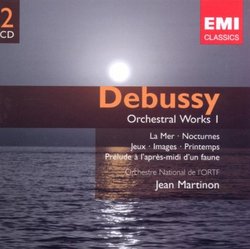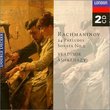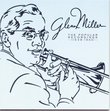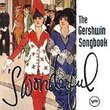| All Artists: Claude Debussy, Jean Martinon, ORTF National Orchestra, Michel Sendrez, Fabienne Boury Title: Debussy: Orchestral Works, Vol. 1 Members Wishing: 0 Total Copies: 0 Label: EMI Classics Original Release Date: 1/1/2006 Re-Release Date: 11/21/2006 Album Type: Original recording remastered Genres: Special Interest, Classical Styles: Marches, Ballets & Dances, Ballets, Historical Periods, Modern, 20th, & 21st Century, Symphonies Number of Discs: 2 SwapaCD Credits: 2 UPC: 094636523521 |
Search - Claude Debussy, Jean Martinon, ORTF National Orchestra :: Debussy: Orchestral Works, Vol. 1
 | Claude Debussy, Jean Martinon, ORTF National Orchestra Debussy: Orchestral Works, Vol. 1 Genres: Special Interest, Classical
|
Larger Image |
CD DetailsSimilarly Requested CDs
|
CD ReviewsAn Outstanding Bargain! Moldyoldie | Motown, USA | 05/29/2007 (4 out of 5 stars) "This two-disc set presenting fine '70s-era performances of Debussy's most popular orchestral works must be one of the most outstanding bargains available! I've owned a previous CD incarnation of what makes up Disc #1 of this set and must say that the present remastering represents a very noticeable improvement; most of the previous harshness is cleaned up and the orchestra, for the most part, sounds clear and distinct. The loud crescendos during La Mer still display a bit of distortion, but not so much as to be disconcerting and dispel one's enjoyment. Conductor Martinon and the sound engineers don't apply the "impressionist gauze" to these works (re: Munch/Boston/RCA and Dutoit/Montreal/Decca); neither will one hear the crystalline delineation of orchestral timbres heard in Reiner and Boulez nor the overt dynamism heard in Tilson Thomas' La Mer. Debussy's notes are simply allowed to speak evocatively on their own with lively, committed performances by the French orchestra. I feel confident in saying that these recordings might well stand alone in any home classical music collection with the possible exception of La Mer, whose many fine recorded interpretations compel duplication." Astounding! Remastered Mastery of a Master Composer G. Stewart | Chesapeake, VA USA | 03/04/2008 (5 out of 5 stars) "Orchestre National de l'ORTF (ORTF stands for 'Office de Radiodiffusion Television Francaise' or 'Office of French Radio and Television'), has been performing since 1934. Their first conductor, Desire-Emile Inghelbrecht, was a friend of Claude Debussy's so it is appropriate that this symphony make this recording, even if not conducted by Inghelbrecht.
Jean Martinon conducts this Debussy tour-de-force and the follow-up, Debussy: Orchestral Works, Vol. 2 which I also highly recommend. Martinon's first instrument was the violin, but he moved on to the piano and eventually to composition. As a member of the French Army, he was taken prisoner in 1940 and spent several years in a Nazi labor camp, where he composed several works. This performance was originally recorded in 1973 & 74, but this remastered re-release is a booming, quality recording of amazing performances by France's foremost symphony orchestra. The 2 disc set contains 9 pieces, some as stand-alone pieces and others as works of several movements. The pieces that contain more than one movement are: ***'La Mer' ('The Sea') - One of Debussy's best known orchestral works. 3 pieces: I 'De L'aube A Midi Sur La Mer' ('From Dawn to Midday at Sea'), is labeled a tres lent and does open softly, slowly, like a calm ocean morning, but builds slowly like a rising tidal current, sweeping and euphonious; II 'Jeux De Vagues' ('Play of the Waves') is a mysterious and playful piece, showcasing its allegro form with quick movements punctuated by rhythmic dancing from the woods, the strings and the horns; III 'Dialogue Du Vent Et De La Mer' ('Dialogue of the Wind and the Sea') is labeled as 'anime et tumultueux', 'animated and tumultuous', and appropriately so considering the title of the piece and the swagger of the orchestra. The entire composition is a marvel and, as described by Debussy, evokes pictures of the ocean in "three symphonic sketches for orchestra". ***Trois Nocturnes - 3 pieces. I 'Nuages' ('Clouds') summons images of light, wispy skies, opens with mainly bassoon and clarinets, and enchants with an impeccable melody that resounds beautifully; II 'Fetes' ('Celebration') flourishing violins give way to flute and horns as this piece opens, and the horns and strings then carry us along to a harmony that is exquisite, before closing again with lively strings and brass; III 'Sirenes' ('Sirens') is largely different from the other pieces in this cd as it contains parts for female choir, singing without words, vocalizing in harmony with the music, and although I prefer music to vocal arrangements, this piece still gives me the chills every time I hear it. ***'Musiques pour "Le Roi Lear"' (Music for King Lear) - composed as incidental music for a stage production. I 'Fanfare' is just that, opening with big horns and booming percussion, then fading to softer horns and accompanying woods with strings supporting; an enjoyable listen, but not as impressive as some of Debussy's more experimental or ground-breaking works. II 'Le sommeil de Lear' (Lear's sleep) is more enjoyable than 'Fanfare' to me; a soft and pensive piece that is dream-like as the title would suggest. ***Images, Serie 3 (Set 3) - this follows 2 sets of Images which were composed for piano. Most strange about this piece is that Debussy originally intended to compose this 3rd set for 2 pianos, but upon communicating with his publisher had begun to lean toward orchestration; thank goodness for that decision as the pieces are overwhelming. I 'Gigues' ('Jig' or 'Dance') is strangely titled as it opens with soft woodwinds and harp, a dreamlike landscape that opens to strings but evokes no desire to dance, rather to dream, to imagine (I actually picture fairy's flying freely as I hear this piece, for what it's worth); II 'Iberia' is triptych in its composition, 3 pieces within the 3 pieces that make up Trois Nocturnes. II.i 'Par les rues et par les chemins' ('In the streets and in the by-ways') is quite appropriately titled, loud and active, staccato permeating the piece. II.ii 'Les Parfums de la nuit' ("The fragrance of the night") is amazing in its ability to communicate the theme; the song brings to mind the scents that would waft on the winds to a cartoon character's nose. II.iii 'Le matin d'un jour de fete' ('The morning of the celebration') opens with soft percussion and plucking strings, the orchestra awakening, making way for bells, horns, woods, string, a cacophony of atonal beauty; this piece is a wonder, slightly bombastic, but marvelous. III 'Rondes de Printemps' ('Dances of Springtime') opens softly, and emerges in to an eerie, vivacious piece that dances between soft and loud, light and dark, melody and dissonance; it is quite remarkable, but very difficult to describe. ***Printemps ('Springtime') 2 pieces - Originally composed as a Symphonic suite with female chorus, here is presented a transcribed version for orchestra without vocal accompaniment; 'Premiere et Deuxieme Partie' (simply '1st and 2nd Part/Piece'). Both pieces are enjoyable, include piano and are muck like pieces composed for concertos. I would not equate this to Debussy's masterful 'Fantasie pour Piano et Orchestra', but the piece presented here is quite nice. The remaining pieces are stand-alone compositions: ***'Prelude a l'apres-midi d'un faun' (Prelude to the Afternoon of a Faun') is one of Debussy's most famous works and is oft observed as a historical turning point in musical composition (although there are many that disagree and discredit Debussy's contribution to the advancement of 20th century/late romantic composition). To state that this piece is beautiful would be simple; this piece is transcendental loveliness that is rarely rivaled. ***'Marche ecossaise sur un theme populaire' ('Scottish March') is a piece that was composed for 4 hands on piano, transcribed here for orchestra. It is a lively yet dark piece. Very pleasant. ***'Berceuse Heroique' ('Heroic Lullaby'), composed originally for piano, and transcribed here for orchestra, was written in response to the German occupation of Belgium. Like the piano piece, this is a gloomy and oppressive piece that occasionally references the Belgian national anthem. It communicates its intended theme thoroughly and is stunning. ***Jeux ('Games') was commissioned for a ballet. It is the last piece for orchestra that Debussy would compose before his death. The piece, due to the controversial nature of the ballet and the release of Stravinsky's 'Rite of Spring' shortly after, was not very successful. But this does not take away from the fact that the piece itself is beautiful. The music is moving and, although Debussy didn't know when he was writing the piece, it was his last orchestra work, a wonderful culmination and combination of his many techniques in composing for orchestra. This is an excellent collection of pieces for orchestra by one of the greatest composers of the 19th and 20th centuries; one of the greatest composers ever, in my humble opinion." |

 Track Listings (11) - Disc #1
Track Listings (11) - Disc #1








